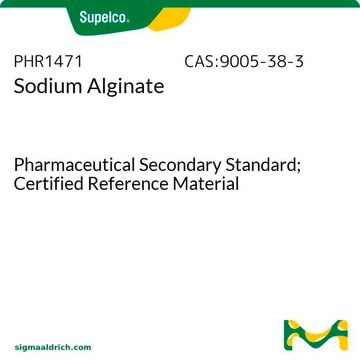180947
Alginic acid sodium salt
powder
Sinónimos:
Algin, Sodium alginate
About This Item
Productos recomendados
biological source
algae (marine)
Quality Level
form
powder
viscosity
15-25 cP, 1 % in H2O
InChI
1S/C6H10O7.Na/c7-1-2(8)4(5(10)11)13-6(12)3(1)9;/h1-4,6-9,12H,(H,10,11);/q;+1/p-1/t1-,2-,3-,4?,6+;/m0./s1
InChI key
MSXHSNHNTORCAW-MPGIDXPLSA-M
¿Está buscando productos similares? Visita Guía de comparación de productos
General description
Application
- in combination with chitosan, to fabricate a biodegradable porous scaffold for bone tissue engineering.
- to study the characteristics of a modified amphiphilic alginate derivative
- to the study the impact of alginate on the rate of lipid digestion by employing an in vitro digestion model
- in the preparation of alginate hydrogels
- as encapsulating agents of microparticles of β-galactosidae
Storage Class
11 - Combustible Solids
wgk_germany
WGK 1
flash_point_f
Not applicable
flash_point_c
Not applicable
ppe
Eyeshields, Gloves, type N95 (US)
Certificados de análisis (COA)
Busque Certificados de análisis (COA) introduciendo el número de lote del producto. Los números de lote se encuentran en la etiqueta del producto después de las palabras «Lot» o «Batch»
¿Ya tiene este producto?
Encuentre la documentación para los productos que ha comprado recientemente en la Biblioteca de documentos.
Artículos
Chitosan is a naturally occurring polysaccharide ideally suited for use in medical supplies, devices, therapeutics, and diagnostics. The unique natural characteristics of chitosan include its cationic, biocompatible, biodegradable, non-toxic, non-immunogenic, and antimicrobial properties.
Collagen molecules play a critical role in tissue architecture and strength, and in cell-matrix interactions as insoluble ligands to regulate the diverse phenotypic activities of cells.
Hydrogel-based biomaterials for cell delivery and tissue regeneration applications are discussed.
Nuestro equipo de científicos tiene experiencia en todas las áreas de investigación: Ciencias de la vida, Ciencia de los materiales, Síntesis química, Cromatografía, Analítica y muchas otras.
Póngase en contacto con el Servicio técnico







